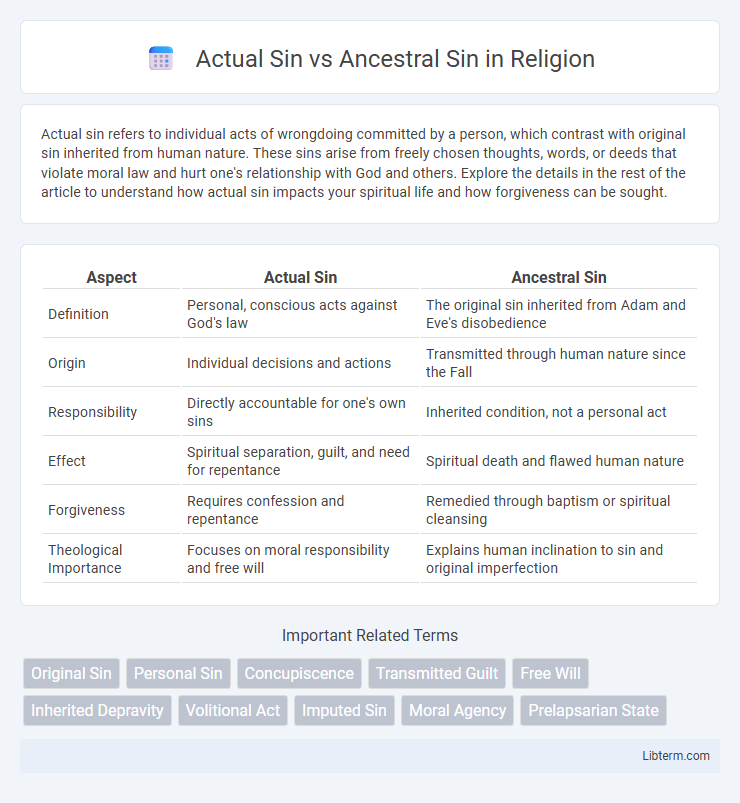Actual sin refers to individual acts of wrongdoing committed by a person, which contrast with original sin inherited from human nature. These sins arise from freely chosen thoughts, words, or deeds that violate moral law and hurt one's relationship with God and others. Explore the details in the rest of the article to understand how actual sin impacts your spiritual life and how forgiveness can be sought.
Table of Comparison
| Aspect | Actual Sin | Ancestral Sin |
|---|---|---|
| Definition | Personal, conscious acts against God's law | The original sin inherited from Adam and Eve's disobedience |
| Origin | Individual decisions and actions | Transmitted through human nature since the Fall |
| Responsibility | Directly accountable for one's own sins | Inherited condition, not a personal act |
| Effect | Spiritual separation, guilt, and need for repentance | Spiritual death and flawed human nature |
| Forgiveness | Requires confession and repentance | Remedied through baptism or spiritual cleansing |
| Theological Importance | Focuses on moral responsibility and free will | Explains human inclination to sin and original imperfection |
Introduction to Actual Sin and Ancestral Sin
Actual sin refers to the individual acts of wrongdoing committed by a person, directly involving personal choice and moral responsibility. Ancestral sin, often termed original sin, represents the inherited state of sinfulness passed down from the first humans, impacting human nature and separating individuals from divine grace. Understanding the distinction highlights how actual sins are personal and conscious acts, while ancestral sin is a foundational condition affecting all humanity.
Defining Actual Sin: Meaning and Examples
Actual sin refers to personal, conscious acts of wrongdoing committed by an individual, involving deliberate choices that violate moral or divine laws. Examples include theft, lying, or committing adultery, where the sinner is fully aware of the offense and its ethical implications. Understanding actual sin emphasizes personal responsibility and accountability for one's actions, distinct from inherited or ancestral sin, which concerns the original state of sinfulness passed down through generations.
Understanding Ancestral Sin: Origins and Implications
Ancestral sin, rooted in the doctrine of original sin, traces back to the disobedience of Adam and Eve, signifying humanity's inherited fallen state. This concept emphasizes the transmission of sin's consequences across generations, impacting human nature and spiritual condition from birth. Understanding ancestral sin is crucial in theological discussions as it highlights the inherent need for redemption and baptism in many Christian traditions.
Theological Foundations of Actual Sin
Actual sin, rooted in personal choice, involves conscious acts that violate divine law and moral order, distinguishing it from ancestral sin, which pertains to the inherited fallen state of humanity. Theological foundations emphasize individual responsibility and culpability, highlighting the necessity of personal repentance and divine grace for redemption. This doctrine underlines the significance of free will in ethical decision-making and spiritual accountability within Christian theology.
Historical Context of Ancestral Sin
Ancestral Sin, historically rooted in early Christian theology, traces back to the teachings of St. Augustine in the 4th century, emphasizing humanity's inherited guilt from Adam and Eve's original disobedience. This concept differs from Actual Sin, which refers to the personal, individual acts of sin committed by a person throughout their life. The doctrine of Ancestral Sin shaped the development of doctrines on human nature, salvation, and baptism in Western Christianity.
Key Differences Between Actual and Ancestral Sin
Actual sin refers to the individual's personal, conscious acts of wrongdoing, involving deliberate choices that violate moral law. Ancestral sin, often termed original sin, is the inherited state of moral corruption passed down from the first humans, affecting all humanity by birth rather than personal action. The key difference lies in actual sin requiring personal commitment to sin, while ancestral sin is an inherited condition impacting human nature universally.
Impact of Actual Sin on Personal Spirituality
Actual sin directly affects personal spirituality by creating a barrier between the individual and God, leading to guilt, spiritual weakening, and alienation from divine grace. It disrupts inner peace and moral integrity, diminishing the believer's capacity to grow in holiness and maintain a fruitful prayer life. The ongoing presence of actual sin necessitates repentance and reconciliation to restore spiritual harmony and closeness with God.
Effects of Ancestral Sin on Humanity
Ancestral sin, also known as original sin, profoundly shapes humanity by introducing a hereditary stain that corrupts human nature and inclines individuals toward moral failure. This spiritual condition results in a loss of original holiness and justice, affecting all descendants of Adam and Eve, manifesting as a propensity to sin and separation from God. The effects include weakened human will, a distorted relationship with God, and the necessity of divine grace for redemption and salvation.
Doctrinal Perspectives: Eastern vs. Western Christianity
Eastern Christianity emphasizes ancestral sin as a hereditary condition of mortality and corruption without personal guilt, viewing actual sin as individual acts that contribute to spiritual illness. Western Christianity, particularly in Roman Catholicism, teaches original sin as inherited guilt from Adam, necessitating baptism for cleansing, while actual sin refers to conscious, voluntary violations of divine law. Orthodox theology prioritizes the therapeutic restoration of the image of God, whereas Western doctrine stresses legal justice and atonement through Christ's sacrifice.
Contemporary Relevance of Sin in Modern Faith
Actual sin refers to individual wrongful actions consciously committed, while ancestral sin (often called original sin) denotes the inherited state of sinfulness passed down from the first humans. In modern faith contexts, the distinction shapes how believers approach personal responsibility and communal redemption, influencing moral accountability and spiritual practices. Contemporary relevance emphasizes that recognizing actual sins fosters personal growth and ethical behavior, whereas ancestral sin highlights the need for grace and collective healing in faith communities.
Actual Sin Infographic

 libterm.com
libterm.com